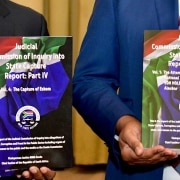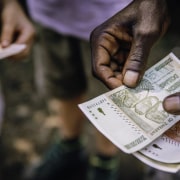|
Getting your Trinity Audio player ready...
|
By Sabeehah Motala
Illicit financial flows (IFFs) are costing Africa $30-billion to $40-billion per year and have eroded African countries’ tax bases, hampering their abilities to respond effectively to Covid-19 emergency needs. Lockdown, states of emergency, and all the accompanying implications mean that developing states are more vulnerable than ever to the possibility of illicit financial flows. Implementation of principles and articles from the African Union Convention on Preventing and Combating Corruption (AUCPCC) is crucial now, to ensure that Africa comes through this pandemic with a good chance of survival.
The fourth African Anti-Corruption Day, taking place on 11 July 2020, is a good opportunity to give prominence to the fight against corruption by commemorating the adoption of the AUCPCC as a mechanism for fighting corruption across the continent.
Widespread IFFs are draining Africa’s finances. In September 2019, Botswana brought a formal request to the South African government for mutual legal assistance, to investigate a case of money laundering where $10-billion, allegedly stolen from the Botswanan government was moved into two bank accounts in South Africa. This request has reportedly been ignored, resulting in further legal action to facilitate the required assistance.
In January this year, Africa’s wealthiest woman, Angola’s Isabel dos Santos, was charged with money laundering, fraud and other crimes, following an extensive investigation by investigative journalists. Dubbed the Luanda Leaks, the probe exposed that dos Santos allegedly misappropriated public money and laundered it abroad, using a network of lawyers, accountants and other professionals.
An investigation by Global Witness and Platform to Protect Whistleblowers in Africa, results of which were released in July, alleges that a mining billionaire from Israel laundered money through a network from Democratic Republic of Congo (DRC) to Israel to Europe, to avoid US sanctions and obtain more mining assets in the DRC.
These high-profile cases demonstrate the need for serious action against IFFs, especially as African countries are facing financial setbacks owing to emergency funding for Covid-19 healthcare, social and economic relief efforts.
Not out of the woods
Unfortunately, the picture could worsen, as the pandemic provides increased opportunities for IFFs. With the need to swiftly implement plans to buy essential medical equipment, often from overseas, huge sums of money are vulnerable to bribery, procurement irregularities and kickbacks. Grand corruption is at risk of increasing, with officials making use of opportunities that arise. In Uganda, four senior government officials face jail time for irregularly awarding contracts to suppliers with inflated prices for food staples.
Furthermore, with borders closed, criminal networks will need to maintain their supply chains somehow, possibly leading to an increase in corruption and money laundering. For example, despite a continuing ban on tobacco products in South Africa, an investigation into the availability of cigarettes during lockdown revealed that they were easily obtainable. Some brands have information and warnings written in Portuguese – likely smuggled into the country. Apparently, the illegal trade of cigarettes between South Africa and Zimbabwe is booming.
The desire of the affluent to move wealth from weaker to stronger economies where it will have more worth, and to countries with less taxes and less risk of social or political upheaval, is stronger. In developing countries where lockdown is resulting in job losses, poverty and rising food insecurity, unrest is far likelier, leading the wealthy to want to ‘escape’, which could lead to increased IFFs.
AUCPCC effective if properly implemented
The AUCPCC, ratified by 44 African countries, contains several provisions which, if thoroughly implemented, could assist in reducing IFFs and improving international co-operation. The convention criminalises money laundering and the concealment of profits of corruption. It also requires signatories to implement measures that ensure good auditing in procurement, customs and taxes.
The AUCPCC empowers authorities and courts to obtain financial or commercial documentation, and further provides for the mutual co-operation of signatories, with a view to arresting and extraditing implicated persons, seizing and repatriating assets, and preventing illicit practices in international trade.
Cross-border co-operation yielding positive results
The Tax Transparency Africa Initiative launched its 2020 report in June, and noted “significant progress” in increasing political awareness and commitment to tax transparency, and increasing capability of African countries to implement tax transparency and information-sharing. The report notes that 12 countries profited from technical support, and 20 countries benefited from assistance tailored to their specific needs. It also notes an increase in exchanges of information related to tax investigations, at an increase of 48% between 2018 and 2019, enabling increased tax revenue for a number of African countries.
This is positive, yet there is more work to be done, especially in implementing the AUCPCC. Transparency International has called on African countries to implement legislation on corruption, financial crime and money laundering. Training and provision of resources to law enforcement authorities working to combat IFFs must be increased.
Crucially, transparency must improve. Publicly available databases of blacklisted companies charged and convicted of corruption and related crimes must be developed. A register of beneficial owners must be created and made publicly available, and governments must regulate the disclosure of beneficial ownership.
The knowledge and tools for the prevention of IFFs are readily available. African countries must ensure that resources are directed towards efforts to prevent erosion of their tax bases and theft of income. Tackling IFFs addresses much broader challenges faced by African countries, such as corruption and limited liquidity, and could provide them with the stability they need to enter the next stage of development.








